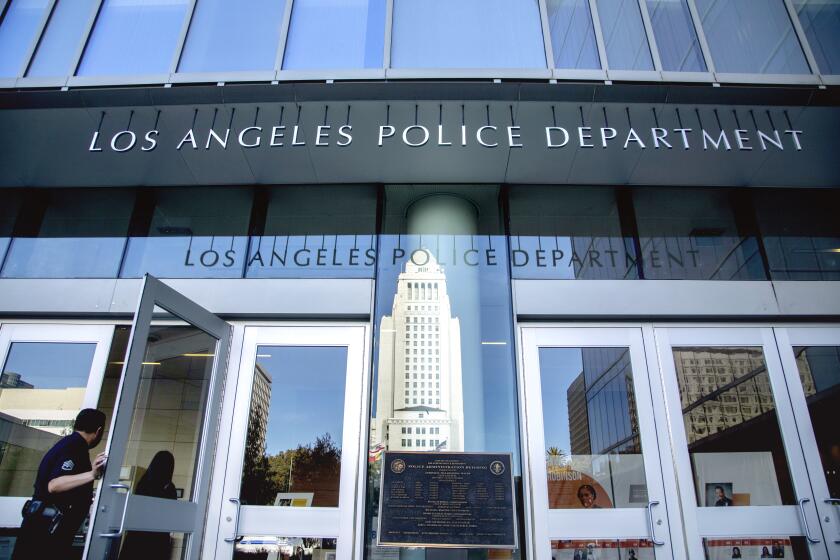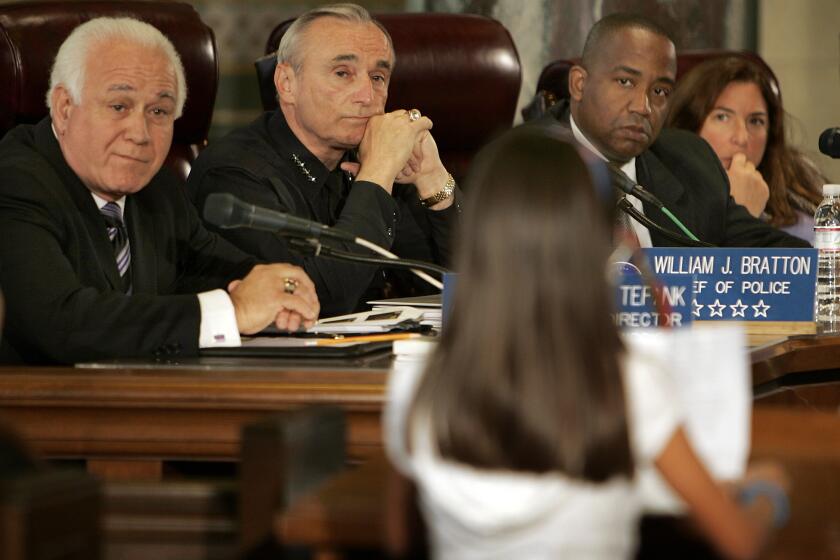Who should be the next LAPD chief? Public shrugs as city asks for input
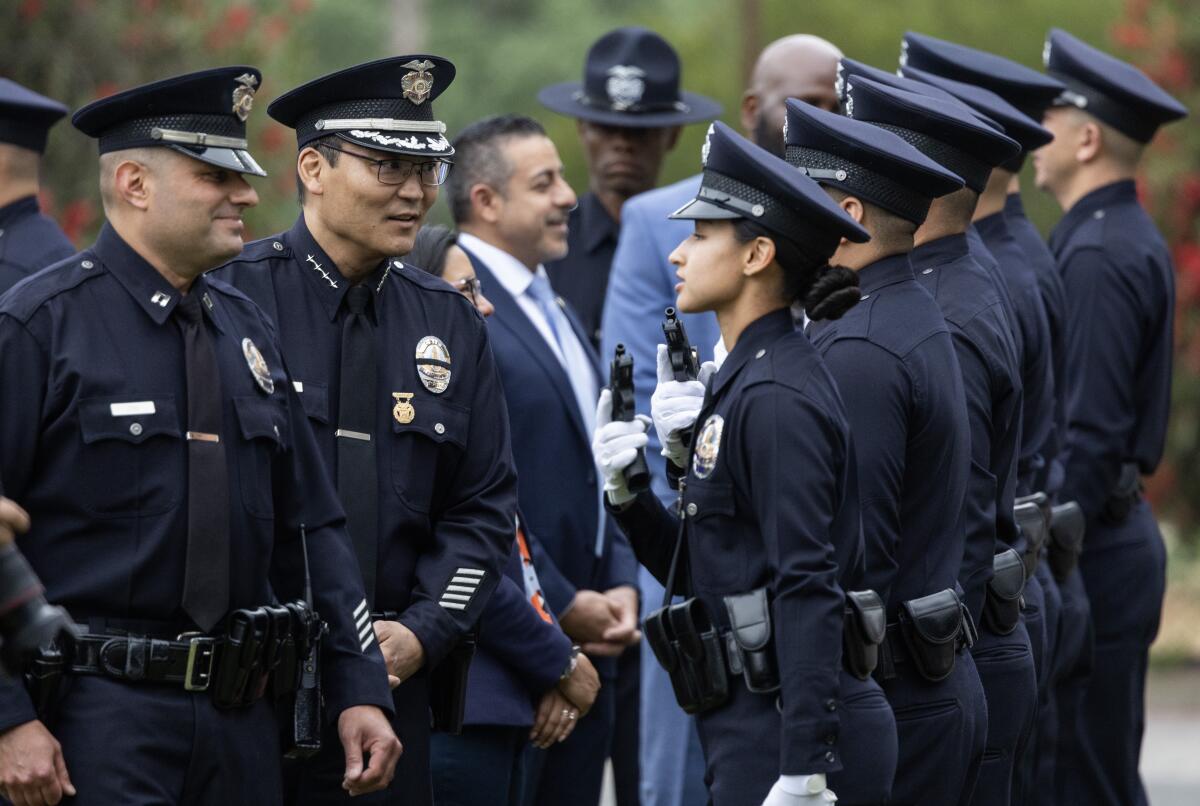
- Share via
Not long after LAPD Chief Michel Moore announced his retirement in January, the guessing game started up at department headquarters about who would replace him.
Factions formed behind the early contenders. Many in the command staff have since taken to scrutinizing Mayor Karen Bass’ interviews and public appearances for hints about her thinking as she prepares to choose the next chief. Officers have spent the past few months sifting through rumors about potential candidates on private Facebook groups.
But for all the fixation on the chief’s search inside the Los Angeles Police Department, the public has largely reacted with a collective shrug. As the Police Commission continues its citywide listening tour to hear about what residents want to see in the department’s next leader, many of the stops have seen a low turnout. Organizers said one meeting aimed at teenagers was cut short last week because of poor attendance.
Asked about the apparent lack of public interest in the search process, a Bass spokesperson said she has met with a cross-section of Angelenos and is awaiting the results of a community survey that will inform her decision.
“Proactive engagement is key,” the spokesperson, De’Marcus Finnell, said. “Over the course of the search, Mayor Bass has convened and met directly with hundreds of LAPD officers, Chamber of Commerce members, violence intervention organizations, victims of crime, and civil rights organization leaders about what they want to see in the next chief.”
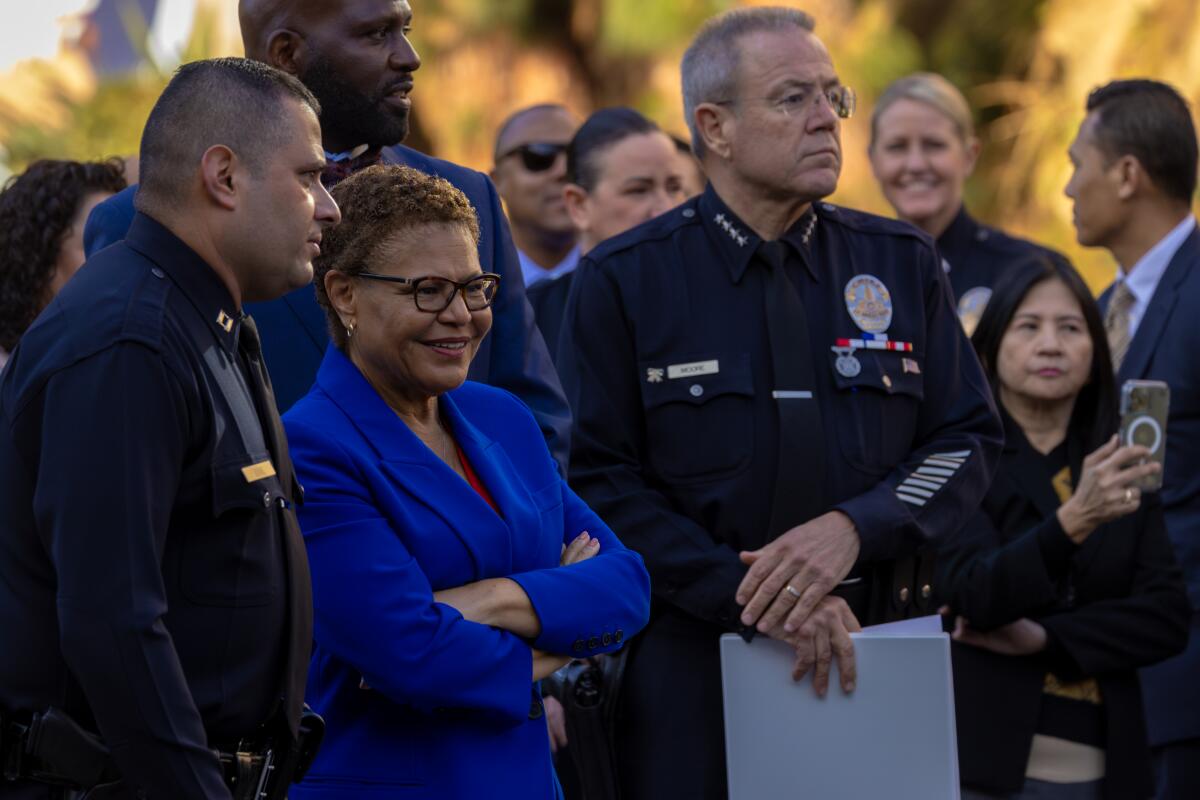
Among the handful of speakers at a virtual town hall for residents of the West San Fernando Valley, the majority said the next top cop should be someone from within the LAPD’s ranks. They argued that it would take too long for an outsider to get up to speed on the department’s history and the dynamics of a city as vast and diverse as L.A.
Others said they hoped the next chief would address officer morale and do something about the long wait times for the city’s nonemergency hotline. Lionel Mares, who spent decades with the L.A. County district attorney’s office before his retirement, said the department needs a leader who wouldn’t “just sit in on high-level meetings to get the information,” but also get out of police headquarters and spend time in various communities.
Most of the speakers pitched their support for Deputy Chief Alan Hamilton, who had a long stint in the Valley before taking over the detective bureau. Hamilton is one of several current and former top LAPD officials who have confirmed to The Times that they have applied or intend to apply.
Even in seemingly clear-cut cases of serious misconduct, the LAPD’s disciplinary system has led to outcomes in which those involved keep their jobs and continue collecting paychecks. Now, some leaders are renewing calls for a radical overhaul.
Bass will make the final selection from a list of applicants narrowed down by the Police Commission. Commissioners have said they hope to finish evaluating what could be dozens of candidates and offer Bass their top three suggestions in August.
Moore has stayed on as a consultant on the chief’s search and technology upgrades, earning $20,000 a month, according to a contract approved by the commission.
A spokesperson for the commission said at least 18 people had applied as of last week, ahead of a June 16 deadline.
For the record:
10:14 a.m. June 4, 2024An earlier version of this article listed LAPD Deputy Chief Ruby Flores among the candidates for the chief job. Flores told The Times she does not intend to apply.
Those who have confirmed to The Times that they have applied or intend to apply include Assistant Chief Blake Chow, who oversees LAPD special operations; Deputy Chief Emada Tingirides, commanding officer of the department’s South Bureau; Deputy Chief Donald Graham, who heads the Transit Services Bureau; Robert Arcos, a former LAPD deputy chief who works for the district attorney’s office; and Art Acevedo, who led police agencies in Austin, Texas, Houston and, briefly, Miami.
Deputy Chief Ruby Flores, who leads the Valley Bureau, was thought to be a candidate, but Flores told The Times she does not intend to apply.
Whoever gets the job will have to confront the complex, intertwined problems facing the city, including homelessness and the fentanyl crisis. Running the LAPD involves balancing demands that are often at odds: Reduce crime, without trampling constitutional rights. Crack down on problem officers and excessive force, without alienating the rank and file. Put more cops on the streets, while keeping the force diverse and maintaining recruitment standards. And cut costs as the city’s budget shrinks.
Despite what officials say is a surge in applicants, the LAPD projects to end this budget year with just over 8,908 officers — potentially the lowest sworn staffing level in more than two decades.
A Times review shows the LAPD’s academy is graduating about half the number of recruits needed per class to keep pace with Mayor Karen Bass’ ambitious plan to expand the department to 9,500 officers.
A commission listening session on Thursday night drew a slightly larger crowd of roughly two dozen residents, several of whom said the most important characteristic the next chief should possess is the “courage” to make tough decisions.
Another speaker, Brandy Muñiz, executive director of the nonprofit All Peoples Community Center, said the next LAPD chief needs to address allegations of uses of force and racial profiling that have long strained the department’s relationship with many Black and Latino residents. “I think it’d be great to have an innovator” who leverages technology to improve transparency by publishing data “to show that changes are happening,” she said.
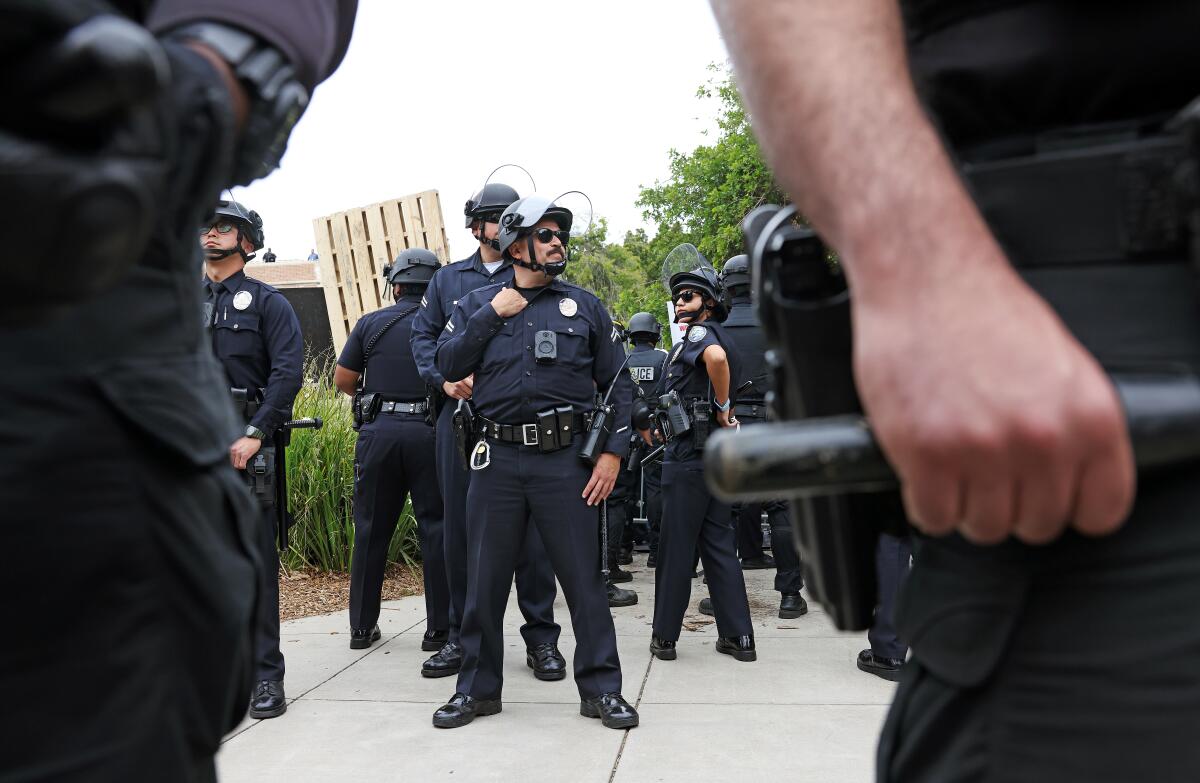
Another attendee brought up the importance of continuing to train officers to de-escalate encounters with people experiencing some form of crisis without using serious force — a renewed area of focus inside the department following a recent string of shootings of mentally ill people with edged weapons such as knives.
According to a job description released by the Northern California firm hired to run the search, the ideal candidate will be forward thinking and “driven to implement best policing practices to reduce crime and increase community trust, including supporting alternative response models.”
“The successful candidate will also serve as a mentor to staff, leading by example and holding staff accountable,” the description said.
Baba Akili, a prominent activist with Black Lives Matter Los Angeles, said that he doubts that such a transformative leader exists. But he said he hopes that the new chief won’t just try to placate activists by “appropriating their language,” but actually make an effort to confront the department’s culture of racism and make changes that the public has been calling for.
“Are they gonna advocate for more money for prevention and intervention in a separate department away from them? I don’t think so,” Akili said following a recent commission meeting in the Valley’s Mission Hills neighborhood.
Michael Stephens of Southern California Ceasefire Committee, a coalition of community-based organizations that focus on violence prevention and reentry services, said he wants the next chief to support the efforts of the network of peacekeepers, who have become an integral part of the city’s fight against street gang violence for years.
“We’re hoping to get a chief that’s going to recognize that and actually implement that,” Stephens said.
Following a string of departures, Los Angeles faces an unprecedented three vacancies in key police leadership and oversight positions.
More listening sessions are planned in the coming days, officials say.
Paula Ramirez, a longtime public relations professional, said she wonders whether the sparse attendance at meetings boils down to public apathy — and the belief that high-level decisions such as the selection of a new chief are made by powerful interests who don’t represent the average Angeleno.
Whomever she picks, Bass will likely do so with an eye on her political future, either a reelection bid in the 2026 mayoral election or a run for higher office, according to Samantha Stevens, who has a consultancy firm, the Stevens Consulting Group. The mayor’s choice of chief will also say a lot about what direction she wants the department to go in and how to tackle things such as retail crime and traffic deaths, which have captured the public imagination in recent years.
“So does Bass want a police chief that will make her look tough on crime, or does she try to move the public’s view of the world back to a time when we were trying for reforms back after George Floyd was killed?” Stevens said. “What I hear is LAPD needs to be fixed, but it’s not just about rogue cops. It’s a lot about morale and accountability.”
The past two chiefs, Charlie Beck and Moore, were insiders who continued some of those reforms directed by the federal consent decree imposed on the department in 2001, according to Chuck Wexler, executive director of the Police Executive Research Forum, a Washington-based nonprofit that advises police departments on policy matters nationwide. The current search comes in a dramatically different climate surrounding policing, and Bass’ selection will say a lot about whether she believes the LAPD is in need of a major overhaul, he said.
“Today, you got a new mayor, and I just think that the landscape has changed as for expectations, and that’s the case across the country too,” Wexler said. “People want change, but they have difficulty identifying what that will look like.”
More to Read
Sign up for Essential California
The most important California stories and recommendations in your inbox every morning.
You may occasionally receive promotional content from the Los Angeles Times.
